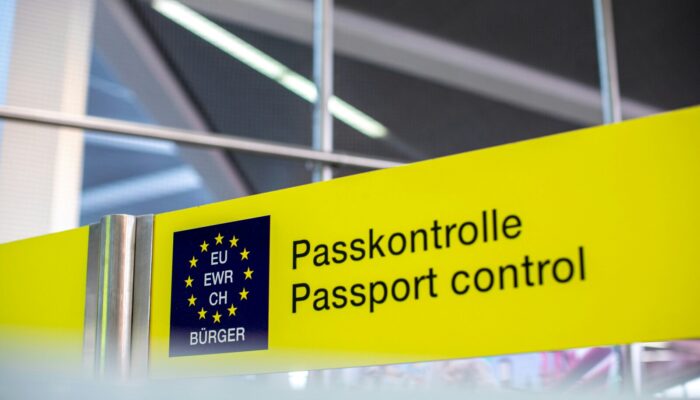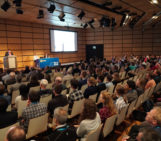
Attending the European Geosciences Union (EGU) General Assembly in Vienna is an invaluable experience, where scientists, researchers, and professionals come together from all over the world to share knowledge, expand networks, and strengthen the geosciences community. However, if you’re coming from a non-EU country and require a visa, preparing for your trip may feel overwhelming. As a former visa-requiring citizen to the Schengen territory, I understand the anxieties that come with the entire procedure. This year, I want to share some tips that were truly helpful to me when I navigated all the visa processes in the past. Remember that EGU and Copernicus are here to support you through every step of the process, from applying for your visa to making the most of your time in Vienna!
Here’s a comprehensive guide with expert tips and “hacks” on navigating visa requirements, avoiding application pitfalls, and finding support to ensure a smooth, rewarding experience at the EGU General Assembly.
Start early: timing your visa application
Timing is critical for a successful visa application. For the Schengen Visa (Type C) required to attend EGU, applications can take anywhere from 15-30 days to process, and sometimes longer during peak travel seasons. Applying early gives you a buffer for any unexpected delays, which can be common.
- Recommended timeline: Start gathering your documents at least 8-12 weeks before the EGU General Assembly. Apply for your visa around 6-8 weeks before the event to allow for processing time and, if needed, corrections or additional submissions. Also, do not forget to book your appointment way in advance (for most EU countries, you can do so up to three months before your travel dates). Do no wait until you have all your documents ready: Remember, you can always cancel an appointment if you need to do so, but getting an emergency one is very difficult, if not impossible depending on your country of residency. Better safe than sorry!
- Monitor processing times: Visa processing times vary based on your country of residence. Check your Austrian consulate’s website for estimated times, and remember that visas can take longer during holidays or when embassies are backlogged.
Double-check your documents: avoiding common mistakes
Having your documentation organized and accurate is essential to avoid delays or rejections. Here’s a checklist with a few “hacks” to ensure your paperwork meets requirements:
- Accurate passport details: Ensure your passport has at least two blank pages and is valid for at six months beyond your intended departure from the Schengen Area (some websites say three months instead, but I had personally experienced issues at border control because of this so make sure it’s six!)
- Proof of financial means: Be specific with financial documentation. If possible, provide statements showing steady income or a bank balance that comfortably covers your trip expenses, with funds marked for “conference travel.” This detail can assure the consulate that you are financially prepared for the trip. If you have a family member that is willing to sponsor you or act as additional support in your application and they are able to show proof of their income of the past three months prior to your application, don’t hesitate to ask them to write you a letter alongside their bank statements + their proof of income to vouch for you. The more financial safety you demonstrate to the consulate, the higher the chances of not getting rejected. You can always add this to your application portfolio even if it’s not among the list of required documents. I did it before when I was still a student and early career researcher, and it always worked!
- Travel medical insurance: Choose an insurance policy that meets Schengen requirements, which covers at least €30,000 and is valid across the Schengen Area. Some insurance providers offer policies specifically for Schengen visa applicants; look for these options to simplify the process. P.S: Always check with your bank as sometimes, being a client comes with complimentary travel insurance that meets the Visa criteria!
- Document copies and translations: Some consulates require specific documents (e.g., invitation letters or financial proof) in both English and the consulate’s official language. Double-check these requirements, and bring multiple copies of each document in case they request duplicates.
Requesting EGU support: invitation letter and guidance
EGU, through its conference organizer Copernicus, is committed to helping attendees with the visa application process by providing a conference invitation letter, which confirms your purpose of travel and supports your application. As soon as you have registered for the event, you can request a letter of invitation through our website.
- What the invitation letter includes: Your invitation letter will confirm your registration, the purpose of your visit, and the dates of the conference. Please note that once registered, you would also receive a public transportation ticket that is valid Monday–Friday, 28 April–2 May 2025, within Vienna (Zone 100). Please note that this ticket does not cover the transportation to and from the airport, but this is information worth mentioning during your visa interview to strengthen your application.
- Additional support from EGU: If you encounter any challenges, please contact EGU for further assistance. We may be able to provide clarification or additional letters if needed, which can sometimes help you with the process.
Hacks to strengthen your application and avoid rejection
Ensuring a smooth approval process can be a matter of following a few key strategies:
- Explain your purpose clearly: When filling out your visa application form, specify that you’re attending the EGU General Assembly as part of your professional work. Emphasize the academic and non-tourist nature of your visit, and use terms like “conference” or “professional development.”
- Worried about paying for accommodation and not obtaining a visa? I understand the anxiety of securing your accommodation and not knowing if your visa will be granted, so my advice to you is to always book options that offer free cancellation.
- Show proof of return: One of the top reasons for visa rejection is concern over an applicant’s intent to return. Include proof, such as a return flight ticket, a letter from your employer or academic institution confirming your return date, or even a personal statement expressing ties to your home country (such as family or ongoing work obligations).
- Schedule an early appointment: Consulates often have limited appointment slots, particularly in peak seasons. Aim to book your visa appointment as soon as you confirm your travel dates to secure a spot and avoid last-minute stress.
- Be polite and prepared at the interview: If your consulate requires an in-person interview, arrive early, dress professionally, and be ready to answer questions about your trip purpose, finances, and ties to your home country. Consular officers appreciate thoroughness and clarity, so having your documents organized and providing clear answers can positively impact your application.
Financial planning tips for Vienna
Vienna is a beautiful city but can be pricey, so it’s smart to plan your budget in advance. Here’s how to stay comfortable financially during your stay:
- Currency exchange: Austria uses the Euro (€). It’s a good idea to exchange some money before you arrive for initial expenses, but most places accept credit or debit cards.
- Watch out for fees: If your bank charges for international transactions, consider using a travel-friendly card with no foreign transaction fees. Some cards also offer free ATM withdrawals, which can save you money on cash expenses.
- Budget tips for Vienna: Vienna’s city center can be expensive, so plan for accommodation, meals, and transportation. Look for budget-friendly options and consider taking advantage of public transportation passes.
Once approved: final preparations for a smooth trip
Once your visa is approved, it’s time to prepare for your travel. Make sure to:
- Double-check your visa details: Before traveling, check that the visa’s start and end dates cover your entire trip and that it allows entry into the Schengen Area. Also double check that your first and last names are spelled correctly.
- Keep copies of important documents: Make physical and digital copies of your passport, visa, travel insurance, and EGU invitation letter. Save these on your phone or a secure online folder.
- Prepare for border control: Keep your invitation letter, return ticket, and accommodation details accessible in case you are asked to present them when entering Austria.
EGU is here to support you every step of the way, and we’re excited to welcome you to Vienna! If you have any questions or need further assistance, don’t hesitate to reach out. We’re thrilled to have attendees from around the world joining us. Safe travels, best of luck with your visa applications, and we look forward to seeing you at the EGU25 General Assembly!



